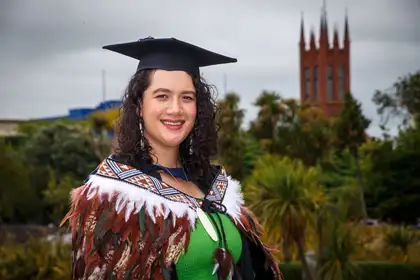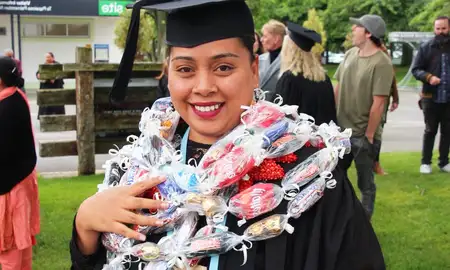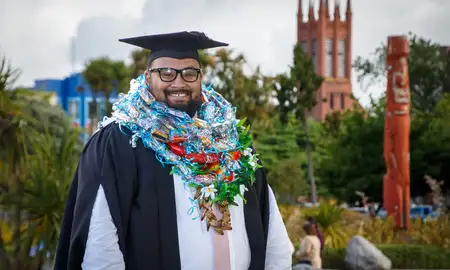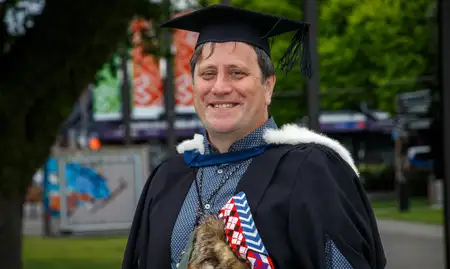
Master of Social Work graduate Kaysha Whakarau
Born into a bustling whānau of 10, Kaysha was raised in an environment of inclusivity and compassion. She says witnessing her parents embrace and nurture those in need cemented her values.
“My parents became caregivers with Child Youth and Family, now Oranga Tamariki. They took on four tamariki who we have a whakapapa connection with and who have become permanent members of our whānau. As the years went by, we had social workers come in and out of our whare.”
Early encounters with social workers ignited a desire to transform a system that often overlooked the importance of whānau connections.
“I always wondered why they only talked about the individual child and not the entire family. This is what led to my social work journey. When I think about key pivotal moments, seeing my parents take on tamariki who were disadvantaged and raise them as their own was instrumental in shaping some of my core values.”
As tangata whenua, Kaysha views her heritage as an identity as well as a compass guiding her professional path.
“As a Māori public servant, I feel I have a responsibility to ensure that tangata whenua have access to culturally appropriate service. This at times requires me to advocate unapologetically and to go against the grain.”
Switching from her original plan of becoming a doctor, Kaysha found her true calling in social work while working with Oranga Tamariki. Seeing few Māori researchers in the field and being inspired by the Māori colleagues around her, she aimed to make a positive impact towards better outcomes and understanding.
While simultaneously completing a Postgraduate Diploma in Bicultural Supervision (Kaitiakitanga) at Te Wananga O Aotearoa, Kaysha’s Master of Social Work pursuit was not without hurdles. Her master's thesis Navigating Mainstream Social Work Settings: Perspectives of Kaimahi (Māori Social Workers) on Opportunities and Challenges encompasses her dedication to unearthing systemic challenges for a more inclusive social work landscape.
“I wanted to raise awareness of systemic issues within our mainstream organisations, to bring to light key issues and how these can be navigated. If we can address these key themes, we will see the productivity of our kaimahi increase and increase longevity within the workspace. Ultimately, this is positive for the whānau we work with.”
Moments of doubt and adversity led her to contemplate quitting, but the unwavering support of mentors and the drive to effect change propelled Kaysha forward.
“I’ve encountered workplace bullying, harrowing Māori statistics, unsafe tamariki, vicarious trauma, COVID-19, changes in relationships, moving house, loss of whānau, health issues and an array of other things. These challenges at times made me question whether I still wanted to finish this mahi.
“At one point I did quit! However, my amazing supervisors Hannah and Tracie instead encouraged me to take a year off and reconsider. In the end, I realised I had come too far to quit. I literally had half my thesis written!”
In the future, she hopes to enrich her understanding of Te Reo Māori.
“I want to learn and be confident in Te Reo Māori. I have enrolled to do this and will be starting in February 2024. In 2025, if I have the capacity, I will be completing my PhD. At this stage, my topic will be how we can incorporate Kaitiakitanga (bicultural supervision) as an everyday practice within mainstream social work settings: from practice, to leadership, to corporate.”
Kaysha remains committed to leveraging her current role to influence nationwide decisions. She employs her professional and cultural expertise to consistently offer feedback and recommendations at work, viewing issues through the combined lenses of social work and Māori perspectives.
“I see my role as a kaitiaki – a role that has influence and provides an opportunity for growth. However, with this role comes great responsibility to ensure that we provide care and aroha in how we move forward as individual kaimahi within the organisation and as a whole.”
Take your career to the next level. Apply now for our post-graduate courses.
Related news
From tropical heat to academic beat
The call to continue her academic study came suddenly for Rene Ulufonua and brought unique challenges which made her November graduation all the sweeter.

A degree 13 years in the making
After a rough start to tertiary study and a long break in the middle, Brian Toleafoa graduated with a Bachelor of Arts in Palmerston North last week.

Graduate grows green thumb to plant a stronger future
Working on ancestral land and engaging in mātauranga workshops inspired Bede Meredith, Te Aitanga a Mahaki, Rongowhakaata, Te Whānau a Kai, to swap his keyboard for gardening gloves to improve the foundations of our whenua.
